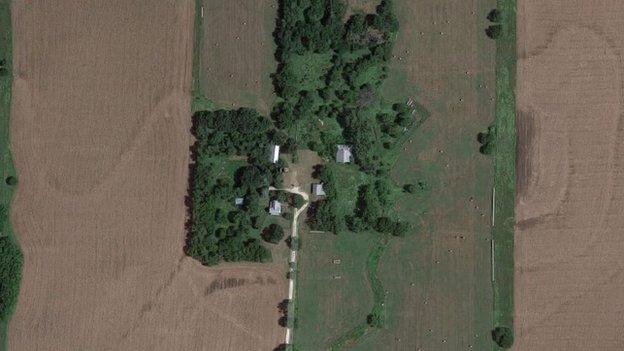US couple sues IP mapping firm over 'digital hell'
- Published

The farm in Kansas is near the centre point of the USA
A US couple is suing an internet mapping firm for $75,000 (Ā£58,000) after years of "digital hell".
MaxMind matches IP addresses, which are used to connect devices to the internet, to physical locations. It has said these are not meant to be precise.
James and Theresa Arnold say it registered their home as the position of more than 600 million addresses.
They say this has led many people to wrongly believe a host of crimes were committed at the property.
"The first week after the Arnolds moved in, two deputies from the Butler County Sheriff's Department came to the residence looking for a stolen truck. This scenario repeated itself countless times over the next five years," documents filed with a Kansas court read.
The Arnolds complained they have been disturbed at all hours by "local, state or federal officials looking for a runaway child or a missing person, or evidence of a computer fraud, or call of an attempted suicide".
The issue came to light in April after an investigation by Fusion, a TV network and website, which reported that the property's owner Joyce Taylor and her tenants had been accused of being "identity thieves, spammers, scammers and fraudsters" for years.
IPs can be used to identify individual houses but can also be imprecise. Sometimes, they only refer to the country a device is in and, in some cases, even that information can be inaccurate.
Fusion said Ms Taylor's troubles were the results of IP mapping by MaxMind, which chose her property as the default spot for IPs it could not locate more precisely other than saying they were in the USA. The house in Kansas, which the Arnolds rented out in 2011, is near to the geographical centre of the country.
'Digital hell'
Since then, they say they have had a constant stream of people who have researched the IP addresses they believe to be behind a string of nefarious activities and found them to be registered to their address.
"In 2013, the Butler County Sheriff Department ran a background check on the plaintiffs because of all the activity taking place at the residence," the court documents say, adding that the department was receiving "weekly reports about fraud, scams, stolen Facebook accounts, missing person reports" linked to the home.
"Threats began to be made against the plaintiffs by individuals who were convinced that the perpetrator of internet scamming lived at the residence. State investigators - convinced that the plaintiffs had been involved in an identity theft - came to the residence to take pictures of assets.
"The following events appeared to originate at the residence and brought trespassers and/or law enforcement to the plaintiffs' home at all hours of the night and day: stolen cars, fraud related to tax returns and bitcoin, stolen credit cards, suicide calls, private investigators, stolen social media accounts, fund raising events and numerous other events."
They accuse MaxMind of "reckless and grossly negligent conduct" that has caused "great emotional distress, fear for their safety, and humiliation" and have asked the Kansas district court to award the damages.
MaxMind said it was aware of the lawsuit but declined to comment on pending litigation.
The company's founder Thomas Mather has previously said: "We have always advertised the database as determining the location down to a city or zip code level. To my knowledge, we have never claimed that our database could be used to locate a household."
He said MaxMind has changed its default centre points to be in the middle of bodies of water.
- Published24 November 2014
- Published14 September 2012
- Published12 March 2012
- Published11 April 2016